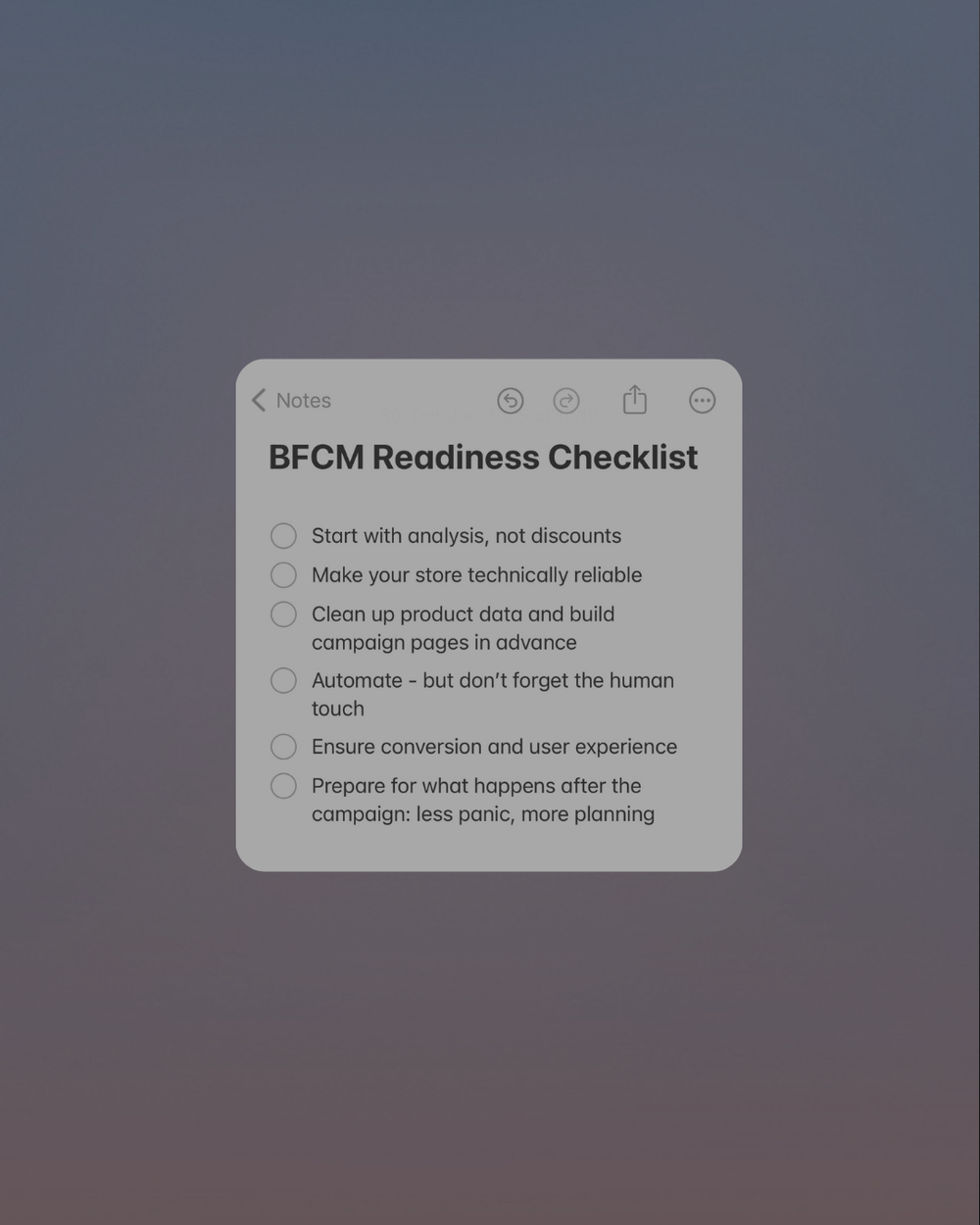
Blog

The Black Friday & Cyber Monday Playbook 2025 reveals how leading Shopify brands turn the busiest week of the year into a long-term growth strategy. Instead of rushed campaigns, broken sites, and short-lived sales spikes, structured preparation and data-driven systems create calm, scalable performance before, during, and after BFCM.

BFCM 2025: Planned growth delivered record results for our customers
Black Friday week confirmed once again that growth in Finnish online shopping does not happen by chance. Consumers waited for the right moment to buy, and when BFCM campaigns were launched, demand exploded – especially in stores that had been systematically developed throughout the year. This year's results clearly showed: long-term optimization, data-driven decision-making and scalable advertising build growth, which is reflected in exceptionally strong sales during campaign weeks.

Shopify Migration Guide 2025 with AI
The Shopify Migration Guide 2025 with AI reveals how leading brands turn migration into a growth strategy. Instead of painful data transfers and lost traffic, AI-powered tools deliver cleaner data, preserved SEO, and optimized customer journeys.

ChatGPT Agents and the Future of Ecommerce
AI agents are quickly surpassing traditional chatbots. While chatbots provide answers, agents take action. With OpenAI’s AgentKit, ChatGPT can now execute multi-step tasks across platforms like Shopify, Klaviyo, and Figma—transforming ecommerce from manual clicks to automated, conversation-driven workflows.

The Art of Collection Pages: Insights from Brancoy & Depict
At Brancoy, we believe collection pages are a key element in e-commerce success. In collaboration with Depict, we’re sharing our insights on how to design seamless, conversion-optimized collection pages that reflect a brand's identity and enhance the shopping experience. Together, we explore why these pages are crucial for driving sales and how to make them work harder for your brand.

How much does it cost to start an online store?
Starting an online store often raises questions about costs and the investments needed. The amount of costs depends largely on the chosen platforms, technical solutions and marketing efforts. In this article, we will go over the most important costs of starting an online store and how to prepare for them.

The best website platform for selling groceries
Selling food online places special demands on an e-commerce platform, from usability to security and scalability. Choosing the right platform directly impacts customer experience, sales and business growth. In this article, we’ll look at why Shopify is a popular choice for online grocery stores and what features you should look for in a competent platform.

What can you sell in an online store?
The success of an online store is largely based on its product range. Choosing the right products directly affects sales, customer experience and business profitability. In this article, we will go over what types of products work best in an online store and what factors should be considered when planning your range.

Is Shopify reliable?
Shopify's reliability is one of the main reasons why it has become a popular e-commerce platform in Finland as well. Its long history, strong technical infrastructure, and high level of security make it a safe choice for both new and growing online merchants. In this article, we will look at what Shopify's reliability consists of and what it means for Finnish entrepreneurs in practice.

What is the easiest online shopping platform to use?
An easy-to-use e-commerce platform is one of the most important decisions an entrepreneur makes when starting or expanding their online business. The right platform not only makes everyday life easier, but also supports growth, improves customer experience, and frees up time to develop the business itself.

Do I need a warehouse for an online store?
Online store warehousing is much more than just storing products – it’s a key part of a smooth customer experience and a pillar of a growing business. The right warehouse model ensures fast deliveries, product availability and efficient logistics, while supporting the scalability of your online store. In this blog, we’ll go over how to choose, manage and optimize warehousing for a successful online store.

What is technical search engine optimization?
Technical SEO is the cornerstone of your online store’s digital infrastructure. It ensures that search engines can find, understand, and index your site’s content correctly – and that your customers get a fast, smooth, and mobile-friendly experience. When technical SEO is in place, you build a strong foundation on which the rest of your digital marketing and sales growth can be built.

What does online store usability mean?
The usability of an online store determines how easily customers can find what they are looking for and complete their purchase. Clear navigation, a smooth checkout process, and a responsive mobile experience not only improve customer satisfaction, but also increase conversions and search engine visibility. A well-designed online store makes shopping effortless and builds trust, which is directly reflected in business results.

How does online shopping work in practice?
The success of an online store is built on a smooth shopping journey – from the moment a customer arrives on your site to the moment the product is delivered. Every step, from navigation to checkout, affects whether the customer finds the purchase easy and enjoyable. In this blog, we will explore how technology, user interface

Does an online store need to have its own domain?
Your own domain is your online store's digital calling card and foundation, which sets you apart from your competitors and builds trust with your customers. It strengthens your brand, improves search engine visibility, and makes your marketing clearer. In this blog, we'll go over why your own domain is critical to your online store's success and how to choose the right name for you.

What is live chat in an online store?
Live chat in an online store provides customers with immediate assistance and personal service during the purchase process. It not only improves the customer experience and builds trust, but also directly impacts conversions and sales growth. When used correctly, live chat acts as a sales tool, a customer service enhancer, and an enabler of proactive sales – all in one seamless digital experience.

What is keyword research?
Keyword research is an ecommerce business’s most important tool for understanding what customers are really searching for online. It reveals their language, search habits, and needs, and helps you target resources to the search terms that drive quality traffic and conversions. Done right, keyword research not only improves your visibility in search engines, but also builds a bridge between your customers and your products – the foundation for sustainable sales results.

Flashnode x Brancoy: 5 ecommerce growing pains and how to solve them with integrations
As your online business grows, you will inevitably face challenges that can make it difficult to expand and scale your business. Certain growing pains are common to almost all emerging D2C brands, and they often stop growth before the market or demand does. We have compiled the most important challenges and solutions based on integrations, automation and systematic growth management.

What is page loading speed and how does it affect SEO?
Page load speed is one of the most important technical metrics in e-commerce – and often a decisive factor in a customer’s purchase decision. Every second counts: fast pages improve the user experience, increase conversions and strengthen search engine visibility, while slow pages easily lead to lost sales. That’s why optimizing load speed is a critical part of sustainable growth and competitiveness for e-commerce entrepreneurs.

What is the conversion rate?
Conversion rate is one of the most important performance metrics for online stores – it tells you how effectively your website converts visitors into buyers or other targeted actions. Even if the percentage is small, its impact on your business is large: even a small improvement can be seen directly in sales without additional marketing efforts. That’s why conversion optimization is one of the most cost-effective ways to increase your online store’s revenue and improve your customer experience.

How are online shopping and logistics combined?
Seamless cooperation between e-commerce and logistics is a vital requirement for competitive business today. When systems talk to each other, the customer experience improves, delivery processes are accelerated, and manual work is reduced. Effective integration not only saves costs – it enables growth, scalability, and a smooth everyday life for both the entrepreneur and the customer.

What are ecommerce integrations?
Ecommerce integrations form the backbone of a digital business. They connect your ecommerce platform to other core systems and enable automated, real-time data transfer between systems. When back-end processes run seamlessly, a business can focus on growing sales, streamlining operations, and delivering a seamless customer experience across all channels.

How to get the first customers to your online store?
Acquiring the first customers is the biggest challenge for a new online store – and at the same time, the most important step towards success. Successful customer acquisition begins even before the store opens with pre-launch marketing and continues after the launch as a consistent effort to build visibility and trust.

What are the most important apps for a Shopify beginner?
Shopify apps are a cornerstone of e-commerce success for beginners. Basic tools such as analytics, email marketing, customer service, and security apps offer immediate benefits without complex setups. Starting with free and freemium options allows for growth into paid solutions as needed, keeping the return on investment manageable.

How to integrate Finnish payment methods into a Shopify store?
Integrating Finnish payment methods, such as online banking payments and MobilePay, is essential for a successful Shopify online store. They increase customer trust, speed up the purchasing process, and significantly improve conversions, as Finns prefer familiar and secure payment methods. This guide explains how to integrate Finnish payment methods into Shopify, what options are available, and what technical, financial, and legal considerations should be taken into account. When an online store offers local payment methods, it feels reliable and easy for the customer – and this is directly reflected in sales.

How to measure the visibility of an online store?
Measuring online store visibility is key to sustainable growth and profitable marketing. Without data, you don't know how customers find your store or why competitors are doing better. With the right tools – such as Google Analytics, Search Console, and Shopify's own analytics – you can track organic traffic, search engine rankings, and social media reach in real time. Regular analysis reveals which actions are producing results and where there is room for improvement. By systematically monitoring visibility, you can make informed decisions, optimize your marketing, and steer your business growth in the right direction.

Why is a newsletter important for an online store?
Newsletters are the most direct and cost-effective way for online stores to reach customers without algorithms or advertising budgets. Email marketing generates a better ROI on average than any other digital channel and helps build long-term customer relationships through personalized content and regular communication.

Can I sell on Shopify without inventory (dropshipping)?
Shopify allows you to run an online store completely without your own inventory using the dropshipping model. In this model, the supplier handles the storage, packaging, and delivery of products directly to the customer, while you focus on marketing, customer service, and brand building. Dropshipping makes online retail an easily launched business with minimal start-up costs and risks.

How to calculate the profitability of an online store?
E-commerce profitability shows how much your business truly earns after all expenses – not just sales volume, but actual profit. Monitoring it reveals whether your pricing, costs, and marketing are in balance. Key metrics like gross profit margin, customer acquisition cost, and customer lifetime value help you understand what's working and what's not. By optimizing pricing, cutting unnecessary costs, and leveraging automation, your e-commerce business will start growing profitably – not just in revenue, but also in net income.

How does Shopify differ from other e-commerce platforms?
Shopify is a cloud-based e-commerce platform that offers an easy and fully managed way to sell online. It handles technical maintenance and scalability automatically, allowing entrepreneurs to focus on growing their business. Its wide range of apps and intuitive interface make it popular with both beginners and growing businesses.

How to ensure the cybersecurity of a Shopify online store?
Shopify security means protecting the online store and customer data from cyber threats. The platform's built-in protections, such as SSL certificates, PCI DSS compliance, and malware monitoring, ensure secure payment transactions, while the merchant's own actions – strong passwords, two-factor authentication, and access control – strengthen the overall security. Good security is critical because it protects customer trust, business continuity, and prevents financial losses.

How does a meta title affect Google visibility?
The meta title is the most important element of search engine optimization (SEO) for an online store, serving as the first impression in search results. It combines keywords and an attractive message that encourages customers to click on your store. An effectively written meta title significantly improves visibility on Google and increases the click-through rate.

Can you sell services on Shopify?
Shopify allows you to sell services just as easily as physical products, including digital services, consulting, training, or support services. The platform supports various pricing models, order options, and customer management, making service sales flexible. Success requires clear processes for delivery, project management, and customer communication, as well as building trust through a portfolio, references, and customer reviews.

What is organic visibility in online retail?
Organic visibility is the foundation of sustainable growth for e-commerce. It means free search engine visibility, where customers find your products through natural search results without advertising costs. Well-executed search engine optimization (SEO) improves profitability, brings continuous traffic, and increases customer trust. In the long run, organic visibility is the most efficient and cost-effective way for e-commerce to increase sales.

What does the term "long tail keyword" mean?
Long-tail keywords are cornerstones of e-commerce search engine optimization (SEO). They are precisely defined, longer search terms used by customers ready to buy when searching for the exact right product. Using these keywords, e-commerce businesses can reach the right customers, improve conversion rates, and increase sales while avoiding competition.

Is it possible to connect an online store to a brick-and-mortar store on Shopify?
The Shopify POS system makes it easy to combine online and physical stores, enabling omnichannel sales – customers can buy online and pick up in-store, or vice versa. Unified inventory management, payment processing, and customer database improve customer experience and business efficiency.

How to combine online shopping and social media?
Social media and e-commerce are now inextricably linked. Consumers discover products on social media, compare options, and want to buy directly with a single click. When e-commerce and social media channels work seamlessly together, brands gain greater visibility, customer experience improves, and sales naturally increase.

What is the most popular payment method in online stores?
Payment methods are one of the most important factors affecting conversion in e-commerce. Finns still trust online banking payments, but card and mobile payments are rapidly gaining popularity. When payment is easy, secure, and offers a suitable range of options, customers are more likely to complete their purchases.

Is Shopify flexible for a growing business?
Shopify offers a flexible and scalable platform that grows with your business, from a small startup to an international online store. Cloud-based infrastructure, automatic updates, and modular add-ons ensure smooth operation and easy expansion into different markets. This makes Shopify an attractive choice for growing businesses that want to focus on business development rather than technical challenges.

Can you sell digital products on Shopify?
Shopify makes it easy to sell digital products like ebooks, online courses, and software without inventory or shipping costs. Products are automatically delivered via download links, and you can use apps like Digital Downloads, SendOwl, or Sky Pilot for management. Pricing should be based on product value, utilizing bundles and promotions, and optimizing sales through analytics and upselling.

How much does your online store really cost?
Most brands know their online store could be better — but few realize how much inefficiency is really costing them. A slow website, broken plugins, and constant bug fixes not only cost money, but also time and growth opportunities. The true cost of an online store is only revealed when you look at the Total Cost of Ownership (TCO). It reveals how much your current platform is really consuming — and how much of a difference it can make when your technical environment supports growth rather than hinders it.

Can you sell products on Shopify without inventory?
Inventory-less sales on Shopify means running an online store without your own warehouse, implemented for example through dropshipping, print-on-demand, or digital products. Shopify apps automate processes, but success requires reliable suppliers, good customer service, and active marketing.

Why is internal linking important for SEO?
Internal linking is a cornerstone of e-commerce SEO, connecting your website's content and guiding visitors naturally through the purchase funnel. Well-executed internal linking improves search engine visibility, effectively distributes website authority, and supports sales by increasing time spent on the site and conversions. Strategically placed links make your online store both user-friendly and search engine friendly.

What hidden costs can be associated with online shopping?
The true costs of e-commerce are not limited to just the platform fee. Add-ons, transaction fees, and payment processing fees easily increase monthly expenses. Hosting, security, technical support, and marketing also add significant costs. Furthermore, legal obligations such as GDPR compliance, accounting, and insurance increase expenses. Considering these hidden costs during the planning phase helps maintain better control over the profitability of the online store.

Why is Shopify a popular e-commerce platform?
Shopify has risen to become one of the world's most popular e-commerce platforms because it combines ease of use, versatile features, and growth potential into a single solution. Setting up an online store is possible without technical expertise, and the platform grows with the business, from a small startup to an international player. Shopify offers all the tools a successful online store needs – from order processing to marketing, analytics, and payment solutions.

BFCM Readiness Checklist
Black Friday and Cyber Monday aren’t just promotional days. They’re the most important test of the year for your online store. BFCM shows how ready your store is to withstand the pressure, drive sales, and maintain a controlled brand experience when traffic, expectations, and competition are at their highest. Most brands start preparing too late. The best ones start with a plan, and that’s why they grow, not just survive.

How to easily set up an online store?
Setting up an online store is easier than ever today, provided you have the right tools and a clear plan. Popular platforms like Shopify and WooCommerce offer ready-made solutions for payments, shipping, and design. However, success requires more than just technical implementation – customer experience, marketing, and service quality are crucial factors in differentiating your online store from the competition.

Shopify and online bank payments – how do they work?
Shopify online banking payments offer Finnish customers a secure and familiar way to pay for purchases directly from their bank account without a credit card. They significantly increase online store trust and improve conversion rates, as most Finns prefer online banking as a payment method. By choosing a reliable payment processor like Paytrail, Klarna, or Bambora, you can offer your customers a fast, mobile-friendly, and secure payment experience in your Shopify store.

How to create your first email campaign for your online store?
Your first email marketing campaign might seem daunting, but with a few basic building blocks, you can get started effectively. You need the right tool, a growing email list, and a clear message that resonates with your customer. In this blog, you'll learn how to build effective email marketing for your online store that supports sales and customer relationships – step by step.

How to use discount codes to increase sales?
Discount codes aren't just a way to attract customers – they're a strategic tool for growing e-commerce businesses. A properly timed and targeted campaign can improve conversions, acquire new customers, and strengthen customer loyalty. In this blog, we'll explore why discount codes work, how to choose the right type of discount, and how to measure the true profitability of your campaigns.

How to optimize images for SEO in an online store.
Image optimization is one of the most effective, yet often underutilized, SEO techniques for e-commerce. Fast loading times, improved search engine visibility, and a visually appealing user experience are all built upon well-optimized images. This guide will walk you through how to optimize your e-commerce images to support both search engine visibility and sales.

Interpreting Shopify reports to improve sales.
Shopify reports are essential tools for e-commerce merchants in developing their businesses. They provide a clear view of what's really happening in your store – from sales to customer behavior and profitability. By correctly interpreting the data in these reports, you can make better decisions, discover new growth opportunities, and optimize your online store's productivity.

How to write SEO-friendly product descriptions
SEO-friendly product descriptions are the invisible salespeople of e-commerce, influencing both search engine visibility and purchasing decisions. When a product description combines the right keywords, a clear structure, and persuasive language, it elevates the product in search results and convinces the customer to buy. In this blog, you'll learn how to write effective product descriptions that generate visibility and sales.



